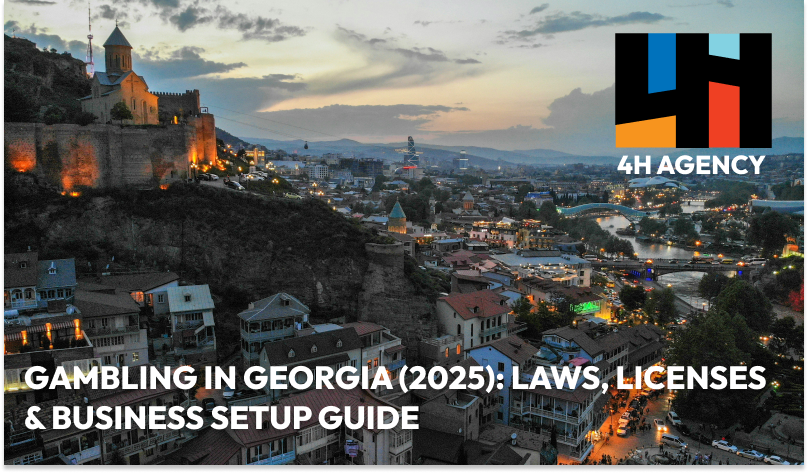Why Invest in Georgia’s Gambling Sector?
Prior to 2025, significant changes in Georgian gambling legislation have further enhanced the country’s appeal for investors. One of the most notable developments is the introduction of a dual-domain model for online gambling businesses. Under the updated Georgian gambling law, operators holding an online gambling license in Georgia can now operate two websites under a single license – one dedicated to Georgian residents and another exclusively for foreign users. These domains must be strictly separated in terms of content, access, and marketing. While this model introduces new compliance layers, it mirrors certain white-label strategies seen in other jurisdictions.
Several other factors make Georgia a compelling destination for establishing a gambling business:
Whether you aim to open an online casino Georgia or pursue a land-based operation, the business-friendly atmosphere and evolving legislative framework offer promising opportunities.
- A stable, transparent legal environment rooted in modern gambling legislation Georgia;
- A balanced fiscal structure, where higher license costs are counterweighted by reasonable gambling taxes in Georgia;
- An emerging regional hub for B2B providers, especially in slots and live gaming solutions;
- A streamlined business setup process, with reduced bureaucratic hurdles;
- A well-established gambling culture among both local and international players;
- Competitive labor costs relative to neighboring European markets.
Whether you aim to open an online casino Georgia or pursue a land-based operation, the business-friendly atmosphere and evolving legislative framework offer promising opportunities.
Types of Gambling Licenses in Georgia
Those looking to start a gambling business in Georgia can apply for various licenses covering both online and offline operations. The following verticals are recognized under the current Georgian gambling regulations:
Corresponding Georgian gambling permits include:
- Online gambling;
- Land-based casinos;
- Land-based sports betting;
- Slot machines;
- Card games;
- Lotteries.
Corresponding Georgian gambling permits include:
- Online casino license;
- Online sports betting license (granted to the holder of a land-based sports betting license);
- Online slots license;
- Land-based casino license (Georgia casino license);
- Land-based sports betting license (betting house license Georgia);
- Slot club license;
- Poker club license (requires land-based casino or slot club license);
- Land-based lottery license (subject to state tenders or monopoly arrangements).

Cost of Gambling License in Georgia
The cost of gambling license in Georgia depends on the type and scope of the operation. Licenses are generally valid for five years, except where indicated otherwise.
Online Gambling Licenses
- Online casino license (separate): ~US$ 1,800,000
- Online casino license (tied to land-based casino): ~US$ 36,100
- Online slots license (separate): ~US$ 361,000
- Online slots license (tied to land-based slot club): ~US$ 36,100
- Online sports betting license (tied to land-based): ~US$ 36,100
If an online gambling license is based on an existing land-based license, its validity corresponds with the latter and does not exceed 60 days beyond the land-based operation's closure.
Land-Based Licenses
Georgian casino license
- Batumi, Bazaleti, Kobuleti, Borjomi: ~US$ 90,200/year
- Gudauri, Bakuriani, Sighnaghi, Tskaltubo: Free
- All other locations: ~US$ 1,800,000/year
Other Land-Based Licenses
- Land-based sports betting license: ~US$ 10,830 to 108,300/year
- Slot club license Georgia: ~US$ 18,050 to 361,000/year
- Poker club license: ~US$ 3,600 to 18,000/year
Holders of a Tbilisi-based casino license may operate up to 3 poker clubs across Georgia without paying additional fees.
Slot club license holders in Tbilisi may operate 1 poker club without extra charges.
There are also accelerated services’ fees for the swiftness of license obtaining. E.g., for online casino and online slots
There are also accelerated services’ fees for the swiftness of license obtaining. E.g., for online casino and online slots:
- Term of twenty (20) days – free;
- Term of ten (10) days – ~US$ 9,200;
- Term of five (5) days – ~US$ 11,000;
Online betting
- Term of twenty (20) days – free;
- Term of ten (10) days – ~US$ 1,800;
- Term of five (5) days – ~US$ 3,700.
Gambling Permit Requirements: Documents and Eligibility
To apply for gambling license in Georgia, applicants must submit a comprehensive package to the regulatory authority, which typically includes:
Application fees are minimal, but the main financial burden comes from annual license fees.
Key personnel involved in the gambling business in Georgia, such as directors, financial controllers, and others with significant influence, must also provide:
Prior to or after receiving the license, the certification with Government’s selected person Random Systems Georgia (the “RSG”) must be done.
In Georgia, certification is regulated and controlled by RSG. Generally, this process includes the presenting to the RSG of the license and the certificates issued by international laboratories with mentioning that relevant gambling product complies with Georgian technical regulations (such as accounts management, winnings, verification and etc.). Then the inspection may be conducted by RSG to confirm the compliance of the games / products and start the integration procedure of the electronic control system. The overall process of certification will include IT audit of the platform, filling in the required forms, and integration itself.
The cost for the full certification from RSG may range from ~US$ 11,000 to ~US$ 13,000. Local costs of integration and further monitoring may also range, with betting games and games belonging to the operator are subject to 0,5% GGR, and games from aggregators are subject to 5% at max.
Further the RSG will confirm and issue the certificate if everything is in order.
- Extract from the corporate register;
- Full game rules for each game offered;
- Certification of gaming platform and game software (including third-party agreements);
- Technical platform documentation;
- Proof of financial resources to cover the license fee;
- Description of operational functions (registration, responsible gambling measures, etc.).
Application fees are minimal, but the main financial burden comes from annual license fees.
Key personnel involved in the gambling business in Georgia, such as directors, financial controllers, and others with significant influence, must also provide:
- Criminal background checks (with a focus on financial crime);
- Evidence of competence and experience in the gambling industry.
Prior to or after receiving the license, the certification with Government’s selected person Random Systems Georgia (the “RSG”) must be done.
In Georgia, certification is regulated and controlled by RSG. Generally, this process includes the presenting to the RSG of the license and the certificates issued by international laboratories with mentioning that relevant gambling product complies with Georgian technical regulations (such as accounts management, winnings, verification and etc.). Then the inspection may be conducted by RSG to confirm the compliance of the games / products and start the integration procedure of the electronic control system. The overall process of certification will include IT audit of the platform, filling in the required forms, and integration itself.
The cost for the full certification from RSG may range from ~US$ 11,000 to ~US$ 13,000. Local costs of integration and further monitoring may also range, with betting games and games belonging to the operator are subject to 0,5% GGR, and games from aggregators are subject to 5% at max.
Further the RSG will confirm and issue the certificate if everything is in order.

Gambling Taxes Georgia
Tax obligations vary depending on the type of gambling license in Georgia.
Online Gambling
- Business fee: US$ 90,200–108,300 quarterly
- Gambling tax: 20% GGR from Georgian players (excluding online sports betting); 5% GGR from foreign players (monthly)
- Sports betting: 7% on deposits (Georgian players)
Land-Based Casino
- Table tax: US$ 7,220–14,440 per table quarterly
- Slot tax: US$ 722–1,440 per slot machine quarterly
Slot Machines Club
- Slot tax: US$ 722–1,440 per slot machine quarterly
- Gambling tax: 20% GGR monthly
Poker Clubs
- Table fee: US$ 1,440–5,050 per table quarterly
It shall be noted that land-based sports betting operations are exempt from GGR taxation.
General Taxation Framework
1. If a foreign (non-resident) company operates a permanent establishment (PE) in Georgia, meaning it has a fixed place of business or ongoing operations in the country, it must pay corporate income tax (CIT) on income earned from Georgian sources. The CIT rate is a flat 15%.
2. The standard VAT rate in Georgia is 18%, and it applies to most goods and services provided in the country as part of business activities.
Goods are considered to be supplied in Georgia if they are physically located in Georgia at the time of sale or transfer. If goods are delivered by transport, the supply is treated as taking place in Georgia if the delivery starts within Georgian territory.
3. If a foreign company earns income from Georgian sources but does not operate through a PE in Georgia, it is subject to withholding tax (WHT). The WHT rate ranges from 4% to 10%, depending on the type of income.
For services, the tax location depends on the nature of the business relationship:
However, there are exceptions for specific types of services such as telecommunications, digital services, advertising, consulting, finance, and insurance. In these cases, even in B2C transactions, the place of supply is considered to be where the customer is located.
Additionally, payments such as interest, royalties, or other Georgian-source income made to companies based in so-called “blacklisted” jurisdictions are taxed at a higher WHT rate of 15%.
2. The standard VAT rate in Georgia is 18%, and it applies to most goods and services provided in the country as part of business activities.
Goods are considered to be supplied in Georgia if they are physically located in Georgia at the time of sale or transfer. If goods are delivered by transport, the supply is treated as taking place in Georgia if the delivery starts within Georgian territory.
3. If a foreign company earns income from Georgian sources but does not operate through a PE in Georgia, it is subject to withholding tax (WHT). The WHT rate ranges from 4% to 10%, depending on the type of income.
For services, the tax location depends on the nature of the business relationship:
- For business-to-business (B2B) services, the place of supply is considered to be where the client (or their office) is located.
- For business-to-consumer (B2C) services, the place of supply is generally where the provider is located.
However, there are exceptions for specific types of services such as telecommunications, digital services, advertising, consulting, finance, and insurance. In these cases, even in B2C transactions, the place of supply is considered to be where the customer is located.
Additionally, payments such as interest, royalties, or other Georgian-source income made to companies based in so-called “blacklisted” jurisdictions are taxed at a higher WHT rate of 15%.
Gambling Compliance Georgia: Restrictions and Enforcement
Operators must strictly comply with Georgian gambling regulations:
Violation of compliance rules can result in:
Importantly, Georgian law targets supply-side violations, whereas players themselves are not held legally liable for accessing unlicensed gambling platforms.
- A cancelled land-based license voids its associated online license;
- Online gambling terminals are not allowed inside land-based venues;
- Applications for online casino, slots, or betting licenses must specify the physical management address and server location within Georgia;
- All gambling servers must be physically located in Georgia and monitored 24/7 via video surveillance;
- Payment service providers are obligated to block Georgian users from transferring funds to unlicensed foreign gambling sites.
Violation of compliance rules can result in:
- Fines up to GEL 20,000 (approx. US$ 7,300);
- Suspension or revocation of license;
- Criminal prosecution with penalties of up to five years imprisonment.
Importantly, Georgian law targets supply-side violations, whereas players themselves are not held legally liable for accessing unlicensed gambling platforms.
Advertising, Age Limits, and Responsible Gambling
1. Gambling advertising in Georgia is restricted but allowed under specific conditions:
Ads must not portray gambling as a fast way to make money, target individuals under the legal gambling age, and violate responsible gambling principles.
2. Age Restrictions:
3. Responsible Gambling Requirements mandate operator to
- Permitted on licensed premises;
- Allowed at airports and customs zones;
- Television and radio ads banned from 6 AM to 12 AM, with exceptions for public-interest broadcasts;
- PIN-protected channels may air gambling content unrestrictedly;
- Online advertising allowed only on licensed platforms;
- Sponsorships are permitted and widely used.
Ads must not portray gambling as a fast way to make money, target individuals under the legal gambling age, and violate responsible gambling principles.
2. Age Restrictions:
- Georgian citizens: 25+
- Foreign citizens: 18+
3. Responsible Gambling Requirements mandate operator to
- Verify identity during registration (KYC);
- Screen users against PEP and sanctions lists;
- Conduct Enhanced Due Diligence if turnover exceeds GEL 5,000 (approx. US$ 1,800);
- Enable users to self-exclude and set limits;
- Display responsible gambling messages in venues and websites.

Step-by-Step Licensing Process for Gambling in Georgia
Below is a simple and most secure way of obtaining Georgian gambling license:
1. Establish a local legal entity – Register your company with the National Agency of Public Registry.
2. Open a corporate bank account – Required to handle license payments and operating funds.
3. Prepare documentation – Gather corporate records, technical documentation, and certificates.
4. Apply to the Georgian gambling regulator – Submit forms and pay the application fee.
5. Infrastructure setup – Ensure that servers and payment systems are located in Georgia.
6. Regulatory review – The regulator may request clarifications and conduct interviews.
7. License issuance – Once approved, the license is granted for up to five years.
8. Certification procedure – If the RSG certification won’t be passed before or after the license issuance, the license may be revoked or not granted.
1. Establish a local legal entity – Register your company with the National Agency of Public Registry.
2. Open a corporate bank account – Required to handle license payments and operating funds.
3. Prepare documentation – Gather corporate records, technical documentation, and certificates.
4. Apply to the Georgian gambling regulator – Submit forms and pay the application fee.
5. Infrastructure setup – Ensure that servers and payment systems are located in Georgia.
6. Regulatory review – The regulator may request clarifications and conduct interviews.
7. License issuance – Once approved, the license is granted for up to five years.
8. Certification procedure – If the RSG certification won’t be passed before or after the license issuance, the license may be revoked or not granted.
Final Thoughts: Is Georgia Right for Your Gambling Business?
Georgia offers a balanced and robust framework for gambling entrepreneurs. While the cost of gambling license in Georgia can be substantial, especially for standalone online operations, this is offset by moderate taxation and favorable market conditions. The licensing process for gambling in Georgia is transparent and streamlined, with growing regulatory clarity and investor support.
The most beneficial way of doing business is establishing land-based casino and applying for a land-based and online casino license. Since it is possible to establish casino in fully cost-free regions (e.g., Gudauri, Bakuriani township, Tskaltubo and Sighnaghi), the overall license fee for operating online casino will be ~US$ 37,000 plus quarter fees. From the market practice and local insights, such land-based casino would be required to spent around ~US$ 660,000 – 920,000 a year for the maintenance of the establishment (excluding tax expenses). It is also possible to locate a live-dealer studio inside casino.
Given its strategic location, cost-effective workforce, and increasingly sophisticated player base, Georgia is a smart choice for launching or expanding a gambling business in 2025. Whether you're seeking a Georgia gaming license for online operations or aiming to establish a physical venue with a Georgia casino license, the opportunities are significant and growing.
If you’re evaluating how to start a gambling business in Georgia, now is the time to act – before regulatory tightening potentially raises the barrier to entry.
The most beneficial way of doing business is establishing land-based casino and applying for a land-based and online casino license. Since it is possible to establish casino in fully cost-free regions (e.g., Gudauri, Bakuriani township, Tskaltubo and Sighnaghi), the overall license fee for operating online casino will be ~US$ 37,000 plus quarter fees. From the market practice and local insights, such land-based casino would be required to spent around ~US$ 660,000 – 920,000 a year for the maintenance of the establishment (excluding tax expenses). It is also possible to locate a live-dealer studio inside casino.
Given its strategic location, cost-effective workforce, and increasingly sophisticated player base, Georgia is a smart choice for launching or expanding a gambling business in 2025. Whether you're seeking a Georgia gaming license for online operations or aiming to establish a physical venue with a Georgia casino license, the opportunities are significant and growing.
If you’re evaluating how to start a gambling business in Georgia, now is the time to act – before regulatory tightening potentially raises the barrier to entry.



